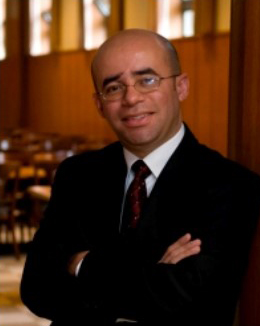By Rhonda Swita
TUPELO – On July 20, 2024, Dr. Hosffman Ospino, a highly recognized Professor of Theology from Boston College, spoke at St. James Church in Tupelo. St. James is blessed to have a diverse community of believers. Dr. Ospino’s message was one of unity and hope, focusing on us being a community of many families, one church and one faith.

Dr. Ospino gave those present at the event a history lesson on the evolution of Catholicism during the earlier days of American life, although mindful that Catholics were present in the country since the sixteenth century. In the early 1800’s there was only one bishop and about 400 churches. But within the next 150 years, many large groups of various nationalities arrived, bringing their own sweat labor and priests. As a result, approx. 20,000 churches were built. Soon to follow were 13,000 Catholic schools, more than 300 Catholic Universities, and many hospitals and other social service organizations. Each nationality pretty much stayed to themselves, building community in their own language, and avoided co-mingling among groups to preserve identity.
However, as the older generations passed on, the newer generations adopted the English language and people became part of the “melting pot” of American culture. People had work and the children were being educated in the Catholic faith. Catholic families were strong in their Catholic faith. By 1950 there were about 30 million Catholics in the United States.
During the 1950s and 1960s, major social changes drove a significant number of Catholics away from traditional ways of being church. Immigration from Europe had slowed down and various cultural revolutions such as the women’s rights movement, new attitudes toward sexuality, and the Civil Rights Movement redefined Catholic life in America. More unfortunate attitudes such as the growing openness to treat the right to “end” life in the womb as a right took hold in our society. Many Catholics stopped practicing their faith. This trend was exacerbated in the early 2000s with the effects of the sexual abuse scandal of children by clergy. Mass attendance declined and thousands of churches and catholic schools have closed.
Although one may think that American Catholicism is in decline, actually the opposite is true. New immigrant Catholics primarily from Latin America, the Caribbean, Asia and Africa, and their U.S. born children, are giving new life to our Catholic communities. They seek Catholic communities to nurture their faith. Those communities already exist. We must build on the lessons from our past and embrace fresher ways to evangelize in the midst of the diversity that shapes American Catholicism to build up the kingdom God in our parishes.
At the talk, Dr. Ospino gave some insights on how to do this. 1) We must educate parents – teach them first, so they can teach their children. 2) Consider family faith formation initiatives. 3) Realize that being multi-cultural is a gift from God. Embrace it. That is who we are. 4) Acknowledge that bilingual communication is okay! Parents speak to their children in different ways. 5) All our pastoral efforts must lead to building communion: with God, with our church, with each other. 6) Practice Misa, Mesa, and Musa. Misa is an invitation to pray together. Mesa is a call to eat together! Nothing is more healing than eating together. Musa is a summons to celebrate together with in a spirit of fiesta! 7) Be attentive to what works well with Hispanic Catholics and other groups. Be open to learn how to be church from the communities that renew American Catholicism.
Dr. Ospino’s message can be summed up as follows: Diversity is not a problem. It’s a gift. Our priority is to facilitate an encounter with Christ. Evangelize and build up the kingdom of God and do it with joy!
(Rhonda Swita is the Director of Faith Formation for St. James parish in Tupelo.)
